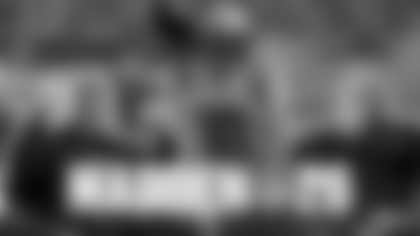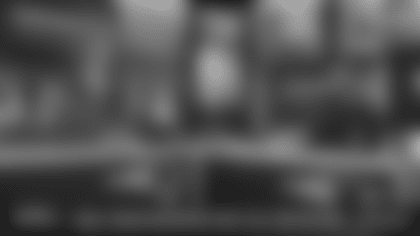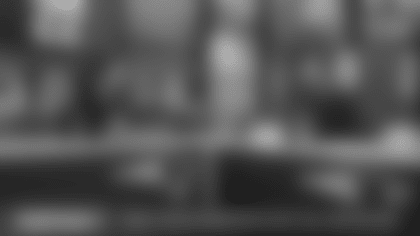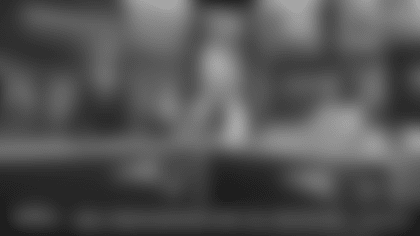After playing for two seasons as a defensive end, Len St. Jean was moved to the Patriots offensive line in 1966 and could be found at right guard for every practice, every preseason game and every regular-season game over the next eight years. Unlike speed, strength and stamina, a player's work ethic is not easily measurable. That said, the work ethic that he demonstrated on the field then and in business today is off the chart.
"I had good quickness and good speed and good upper body strength, but the work ethic was probably my biggest asset," said St. Jean. "I was kind of a weirdo. Believe it or not, I loved practice. I loved training camp. I never missed a game in high school, college or the pros. It's very unusual for that to happen.
"It's an accomplishment, but it's being very fortunate, too. It's a combination of both, I guess. I always stayed in pretty good shape so I think that might have had something to do with it. But I knew guys that were a lot bigger, a lot stronger than I was and they'd end up missing two or three games here or there. I guess I was blessed."
St. Jean's work ethic is something he says he inherited from his dad, Emil. "My father was a workaholic. I was raised on a farm (near Newberry, Mich., a rural community in the state's upper peninsula) and we would also work in the woods, cutting pulp wood and all that kind of stuff," St. Jean said. "We used to have about 40 cows that we would milk. We would sell cream or butter fat and then we used to raise a lot of potatoes, too - 40 or 50 acres of potatoes every year. It was seven days a week, 10-12 hours a day. I still get up at 5:30, 6 in the morning. It was ingrained in me and it's just never going to leave, I guess."
St. Jean uses the early morning starts to begin his weekdays working for All-American Semiconductor in suburban Boston.
"I'm in sales. I sell a lot of electronic components," says St. Jean. "I've been with them for 15 years and before that I worked in sort of the same industry as a manufacturer's rep. I worked for a good friend of mine who played for the Patriots, Larry Eisenhauer, at Datcom for 10 years. And then five years before that I started with a company called Bell Controls. So I've been associated with the electronics industry selling components since I left football.
"[Playing for the Patriots] had an influence. Even to this day it will get my foot in the door at a lot of places where had I not played football, I probably wouldn't have gotten to see certain people. The name, believe it or not, still has a little recognition to it. If you play 10 years in a sport, people do remember the name. So it's had an impact from that standpoint, helping open up some doors.
"The big thing is that it's very competitive. That's one of the things that you could take from football, the competitiveness of it. My job has changed an awful lot because of what's happening with the outsourcing. Most of the companies that we deal with now, they only build prototypes in this country. When it starts production, it goes to China or Taiwan, so it's not nearly as much fun as it used to be."
Having played his home games at Fenway Park, Boston College, Harvard and Schaefer Stadium, St. Jean, an active member of the team's alumni club, still has fun when the Patriots take the field at Gillette Stadium.
"On game day they'll have tables set up and you autograph pictures for people," St. Jean said. "There are people that come and maybe if it's not them they'll say that their father remembers watching you at Fenway Park. It's kind of amazing that people have these memories from when they grew up as a kid and going to a game. A lot of times they'll bring memorabilia from a game, an old program or something like that. It's a pretty nice thing for the people and it's a pretty good thing for you, too."
Selected to the Patriots All-AFL 10-Year Anniversary Team in 1971, there's no question St. Jean was a pretty good player and a team player at that. When he was approached about switching from defensive end to offensive guard in 1966, he did so without reluctance.
"Art Spinney, who was the offensive line coach when I first came there, realized that was probably my best position because of the way I was built," said the 5-11, 250-pound St. Jean, who now makes his home in Stoughton, Mass., with his wife, Susan. "Of course by today's standards, I'd probably be a linebacker or a defensive back. If you don't weigh 300 pounds, if you're not 6-4, 6-5 now, you're not even considered an offensive lineman. But in those days you used to run an awful lot more. They used to pull the guards on just about half the running plays. We used to run as much as running backs did.
"It was really kind of ironic because they had drafted a whole bunch of players: Dick Arrington out of Notre Dame, Karl Singer out of Purdue, Jim Boudreau (Louisiana Tech). All these guys were sort of high profile players coming out [of college] and they were all offensive linemen. So I figured, man, I'm in trouble. Big trouble. But it was a very natural position for me. Within four weeks I went from third or fourth on the depth chart to where I was starting and it just went from there. Spinney was absolutely right. I should have been playing there from the day I walked onto the Patriots training camp."


































